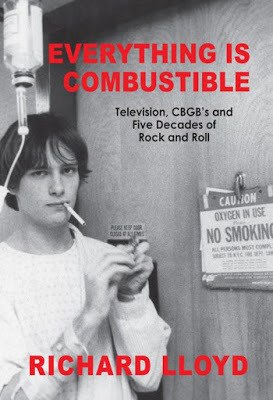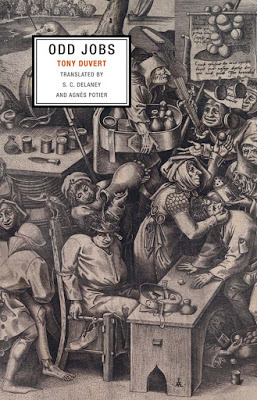Tosh Berman's Blog, page 162
November 22, 2017
"Paul Bowles on Music" edited by Timothy Mangan and Irene Herrmann (University of California Press)
 ISBN: 9780520236554 University of California Press
ISBN: 9780520236554 University of California PressPaul Bowles, the writer, meets Bowles the composer, who wrote music criticism in the 1940s. The critiques he wrote in themselves are not that fascinating, but what's interesting is the culture that was presented in New York City during that era, and the coverage of the mainstream media at the time, with someone smart and brilliant as Bowles covering the "Waterfront."
Bowles as most of us knows as readers is a writer of great skill but also wrote from a great distance. His work, especially his short stories, is reporting another culture, which is odd, strange, and unknown to the westerner. In a sense, Bowles was the head ant investigating the other culture for food and music and reported back to the American culture of that and future time. What you see here is Bowles, primarily a composer at the time, writing about various music recitals/concerts that took place in Manhattan. The majority of the events are classical recitals, but there are some side trips to see jazz (at mostly big venues) and folk (again, in major concert halls of the time). He doesn't go to jazz or folk nightclubs to do his reporting, but mostly to places like Carnegie Hall and so forth. So, in a sense, he's reporting on music culture, not for the specialist, but in most cases for the casual reader who looks through the newspaper for local news or events. Some articles he did write for special interest publications, but even these pieces are geared for a broad readership.
As a writer and a publisher, as well as someone who loves music and music criticism, I find Bowles extremely important. For one, I love his music, what I have heard so far, and two, it's fascinating to notice his 'place' in that society that was New York. He was very interested in other cultures even in the 1940s, and often it seems like he went to South and Central America to discover new music, but was disappointed to realize that even then, countries were officially hindering certain type of music for a more commercial take on that world. Bowles also covered film movie music for a specialist magazine in that field. As far as I can gather, he would go to see the film, and just report on the music how it was used in the film. That's interesting! Also, he reviewed books on music (again, mostly classical, but some books on jazz) as well as recordings. So he was probably one of the earliest critics to talk about records, for a well-read journal/newspaper, the New York Herald Tribune. Also, there is an interview with Bowles, one of his last conversations with an interviewer about him working as a critic. That alone is a fascinating document.
Published on November 22, 2017 11:29
November 19, 2017
Lun*na Menoh artist on Tea With Tosh
An early episode of Tea With Tosh, shot in 1987, which is also the last episode of Tea With Tosh as well. I met Lun*na Menoh in Los Angeles at an opening of her show at a cafe. I was totally knocked out by her work, and invited Lun*na to do an episode of "Tea With Tosh." A week later I asked her to marry me, and we are to this day still a married couple. With all respect, I'm basically a groupie. Here she talks about her work, but keep in mind this is what she was doing in 1987. Also included are the video works of Shirley (Squid) Ouchi.
Published on November 19, 2017 10:20
November 17, 2017
Tom Recchion Composer LAFMS on Tea With Tosh
My second post for "Tea With Tosh." I did this show in 1986. My guest for this episode is Tom Recchion. A composer, visual artist, and the man who designed the graphics for most of my TamTam Books. Before that happened, I had him on my show. Here we have the Los Angeles Free Music Society (LAFMS) roots, as well as Los Angeles art in this show. Watching it now, I'm so proud of having Tom participate in my program. It's basically a snapshot of a specific time and place - but alas, I feel very tied to Tom's world personally. It was a magnificent time with a wonderful person, that is Tom . - Tosh Berman
Published on November 17, 2017 22:22
November 14, 2017
Sherds Podcast on Boris Vian's "Red Grass" (TamTam Books)

#3 Red Grass by Boris VianIn this episode, we look at Boris Vian's Red Grass (1950), a surrealist science fiction novel in which the main character, Wolf, creates a machine that allows him to erase his own memories. Perhaps a critique or satire of existentialism, perhaps a veiled song of mourning for post-war France, Red Grass is a somewhat obscure novel that really got us thinking.Over the course of our discussion, we consider Vian's playful complexity, his parodies of psychoanalytical and existentialist thought, and the possible significance of Red Grass in terms of French collective memory in the wake of the Second World War. This episode features readings by Kinga Stanczuk
http://www.holdfastnetwork.com/sherdspodcast/12/11/2017/3-red-grass-by-boris-vian
Published on November 14, 2017 12:22
November 11, 2017
"Everything Is Combustible" by Richard Lloyd (Beech Hill Publishing Company)
 ISBN: 978-0-9976937-6-8 Beech Hill Publishing Company
ISBN: 978-0-9976937-6-8 Beech Hill Publishing CompanyThe band Television means a lot to me. Even before I heard a note of their music, they had great importance to me. I saw a photo of the band when Richard Hell was in it, and I was intrigued by their visuals. I liked the haircuts and their clothing. It was no frills and all attitude. I must have been around 18 or 19 when Television hit my consciousness. Not long after, but for sure after Hell left the band, I purchased their single on Ork Records, Little Johnny Jewel" at my local punk rock record store, Bomp Records in the Valley. I heard a sound that matched their vision. To this day, and we're talking 40 years later, Television is still a mystery to me.
I have read a lot of books regarding the New York music explosion of the 1970s, including "Please Kill Me" (an excellent book) and various memoirs by musicians of that period (all of them are pretty good). Still, what is Television? And on top of that, who is Tom Verlaine" Richard Lloyd who was one of the remarkable and fascinating characters that came out of the "Please Kill Me" book and even more important, a brilliant guitarist in Television. Verlaine and Lloyd were the bookends, and Billy Ficca (drums) and Fred Smith roamed between those two. Verlaine was and is the primary composer for Television (Hell, when he was in the band, shared songwriting duties, and is brilliant), but that group is constructed like a piece of architecture. Lloyd was part of the building blocks to build this magnificent sound that is Television.
"Everything Is Combustible" is a remarkable memoir, due that Lloyd is a good prose writer and a fascinating guy. Very straightforward, yet metaphysical in his approach to his life, and even with his addictions. He has a mind like a scientist, who wants to analyze the things and people in front of him or in his sights. One of my favorite parts of the book is when Lloyd tries to look at his drug addiction clearly and showed frustration when a medical doctor tries to get him to a 12 step program. At the time, Lloyd wasn't interested in quitting drugs; he just wanted to know in detail the nature of addiction and how it affects the brain/body. In such fashion, he reminds me of William S. Burroughs. To investigate the 'unknown' and somehow try to make it more 'known.'
Lloyd writes his memoir as if it's an original science paper. When he attaches to something, he doesn't let go, until Lloyd masters whatever he desires. His guitar obsession is singular and it's his devotion to the instrument that made him such a remarkable musician. He's egotistical in a sense he knows what he can do, yet his appreciation of other artists are quite open and in its way, a strong focus on him as well. He casually knew Jimi Hendrix as a teenager. I gather he wanted to know what made him such an iconic and fantastic musician. He doesn't look at Hendrix as a fanboy but like a scientist studying in a laboratory. For the mystery part, that is still a mystery to me. The reader gets facts regarding the inner-workings of Television, but what made Tom Verlaine be such an odd fellow? Richard Hell in his memoir wrote about Verlaine, and they were great friends, yet, I didn't feel Hell could penetrate the mystery that's Tom Verlaine. Lloyd doesn't get any closer to Verlaine's character, but you do get great stories about him not using luggage, but laundry or store bags to keep his clothing. The fact is Verlaine is a very strange being and somewhat guarded. One gathers he is a control freak and wants to be in control of Television, but what was it in his background that turn him out that way? Lloyd doesn't answer that question, nor do other memoirists/music historians.
"Everything Is Combustible" is a must-read for those who are fascinated with the CBGB's New York rock world. For whatever reason, or what was breathed in that Manhattan air, concerning that generation of musicians, they left a lot of great literature for us to read (and music too) and for us fans to comment on. Lloyd's book is pretty wonderful in that sense. Superb read.
Published on November 11, 2017 12:45
November 9, 2017
Harry Kipper on Tea With Tosh
As promised, "Tea With Tosh" with my guest artist/performance artist Harry Kipper. In the years 1986/1987 I did 20 episodes of "Tea With Tosh." Gary Calamar came up with the idea of me doing a public access show, and together, with many friends, we did the show. I came up with the concept of a chat show that I imagined would be an afternoon program. The inspiration for me was Dick Cavett and William F. Buckley. At the time, both hosts always had fascinating people on their shows, and another inspitation is when I was suffering from the bad flu/cold sometime in 1985, and I watched a lot of afternoon interview programs on an old black and white TV with horrible reception. I was too ill to get out of bed to fix the set or adjust the channel, so I just let it be. The spirit of the show was to do everything in the present and worry about the future. The past for me was the research of the interview subjects. Also, I wanted to be in an official format where I can ask questions to all the people who came on the show. I would never ask these type of questions in a private conservation - but doing it in front of the (imagined) public seemed OK. I did receive public attention during the run of the show, but mostly through waiters, who many recognize me by watching "Tea With Tosh." It seemed I had a huge following among people who worked as servers in restaurants!
Harry Kipper is a major favorite of mine. I met and socialized with Harry (and his partner, Harry) at Punk venues, but I first met him through my father Wallace Berman, who later arranged for Harry to perform at the Mermaid Tavern in Topanga. Sometime in 1972? Secretly, my father made the flyer for the show and posted it all around Topanga sometime in the very late night. He loved The Kipper Kids. And so do I. Therefore love Harry Kipper. The other "Harry" married Bette Midler, and I believe he became an economic advisor or dealing with finances/stock market.
"Tea With Tosh" with guest, Harry Kipper. 1986. 30 minutes. If you like the show, please give it a like or a comment on the YouTube page.
Published on November 09, 2017 07:51
November 8, 2017
"Tea With Tosh" was a cable access TV program that was pr...

"Tea With Tosh" was a cable access TV program that was produced and done in 1986 through 1987. I did exactly 20 shows. My chit-chat guests were everyone from Philip Glass to Phranc to Peter Case to George Herms to Russ Tamblyn to Bruce Conner to Jack Hirschman to my soon to be wife Lun*na Menoh. I imagine myself as a combination of Dick Cavett and William F. Buckley. With no money, but we all had a vision (of sorts) to define our culture as we lived it. Now, I digitalized the entire series and will slowly (and surely) make it available to the public. What we call "Tea With Tosh."
Published on November 08, 2017 21:56
November 7, 2017
Jimmy Witherspoon /Wallace Berman - "Lush Head Woman"
My father Wallace Berman was a close friend to the great jazz and R n' B singer Jimmy Witherspoon. They wrote a song together, and 'the Spoon" recorded it. Here it is. "Lush Head Woman"
Published on November 07, 2017 13:50
November 5, 2017
Tosh Berman's (Tosh Talks) YouTube Channel
Photograph by Kimley Maretzo
I'm revamping my YouTube channel and very shortly will be adding the early episodes of "Tea With Tosh" as well as making new editions/episodes of "Tosh Talks." I have quite a few episodes on my channel at the moment. Do click on the link down below and subscribe to my station. Merci, Tosh!
https://www.youtube.com/channel/UCft0AQ-7S4YsGEyRG72qmdQ?view_as=public
I'm revamping my YouTube channel and very shortly will be adding the early episodes of "Tea With Tosh" as well as making new editions/episodes of "Tosh Talks." I have quite a few episodes on my channel at the moment. Do click on the link down below and subscribe to my station. Merci, Tosh!
https://www.youtube.com/channel/UCft0AQ-7S4YsGEyRG72qmdQ?view_as=public
Published on November 05, 2017 18:23
October 21, 2017
"Odd Jobs" by Tony Duvert (Wakefield Press)
 ISBN: 978-1-939663-29-0 Wakefield PressJonathan Swift comes to mind while reading Tony Deuvert's "Odd Jobs." The set of stories takes place in a village, and all focus on particular occupations that are held in this village. Or is it even the same village? Nevertheless, there are occupations such as 'the snot-remover,' 'the wiper' (he cleans your ass and collects your poop) and 'the fondler' who skillfully jerks off boys, and so forth. I imagine if you try to locate this specific village it may be difficult. Therefore we're lucky that we have Tony Duvert to lead us to a world, of his own making, and beyond that, a savage satire on family culture and practices. Duvert is a writer who is very sensitive to the concept of family, and how cruel that system can be on individuals and more likely children. A controversial writer in France, the late Duvert reminds me of Fassbinder the filmmaker, in that he too attacked systems that eventually oppressed a class or the public. A social commentator, as well as a very dark humorist, "Odd Jobs" is a remarkable piece of work. Like his "District" (also published by Wakefield Press) this book is a fantastic (although not necessarily) companion to "Odd Jobs."
ISBN: 978-1-939663-29-0 Wakefield PressJonathan Swift comes to mind while reading Tony Deuvert's "Odd Jobs." The set of stories takes place in a village, and all focus on particular occupations that are held in this village. Or is it even the same village? Nevertheless, there are occupations such as 'the snot-remover,' 'the wiper' (he cleans your ass and collects your poop) and 'the fondler' who skillfully jerks off boys, and so forth. I imagine if you try to locate this specific village it may be difficult. Therefore we're lucky that we have Tony Duvert to lead us to a world, of his own making, and beyond that, a savage satire on family culture and practices. Duvert is a writer who is very sensitive to the concept of family, and how cruel that system can be on individuals and more likely children. A controversial writer in France, the late Duvert reminds me of Fassbinder the filmmaker, in that he too attacked systems that eventually oppressed a class or the public. A social commentator, as well as a very dark humorist, "Odd Jobs" is a remarkable piece of work. Like his "District" (also published by Wakefield Press) this book is a fantastic (although not necessarily) companion to "Odd Jobs."
Published on October 21, 2017 16:54



